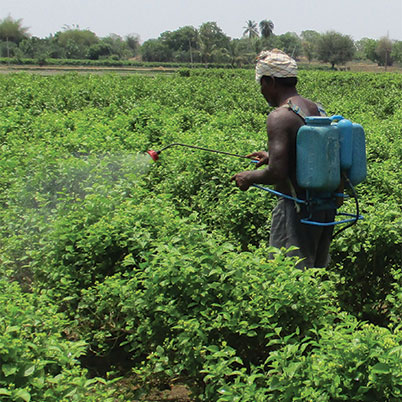PAN Asia Pacific remains deeply concerned about the adverse impacts of highly hazardous pesticides (HHPs) on farmers, workers and communities in the region, and we are looking to the SAICM process, and your leadership in the region, to provide dramatic improvement in the management of pesticides. We attach 3 documents for your consideration at the upcoming Asia Pacific SAICM regional Meeting in Bangkok.
Over a period from 2015-2017 PAN Asia Pacific (PANAP) and partner organisations conducted studies on pesticides use in selected communities and areas in six countries in the region, and we are pleased to provide you with a summary of results. The studies have revealed ongoing use of Highly Hazardous Pesticides under unacceptably hazardous conditions of use, including lack of Personal Protective Equipment, failure to adhere to re-entry periods, lack of training, unsafe storage of pesticides and disposal of containers, contaminated waterways, significant adverse health impacts, and human rights violations.
As a result of these ongoing problems with pesticides, including high rates of poisoning, problems which are also experienced in other regions, PAN has developed a proposal in support of the UN Special Rapporteur on the right to food’s call for a global legally binding treaty on the life-cycle management of pesticides. We believe such a treaty could provide immense benefits to countries in the region, struggling with issues of illegal use and other compliance issues, container disposal, etc. We would love to discuss this proposal with you at the Asia Pacific Regional Meeting and also at the 2nd Intercessional meeting in Stockholm in March, and ask you to support our request for full consideration of this proposal.
PAN is also providing an analysis on why the sustainable chemistry framework is not the right approach for addressing the HHPs issue. ICCM4 recommended that the focus be on agroecological practices when phasing out HHPs, and PAN supports this decision. We think this issue is very important to consider during discussions on finance, and draw your attention to section 3.3.1 on page 14 of the Finance paper. Public finance is the most appropriate way forward for funding the implementation of agroecology and we support every endeavour for funding to be made avaulabel to ocuntors to assist with the impmentation of agroecology and phase-out of HHPs.
Lastly, we support the secretariat’s paper on gender including the proposal for a full analysis of gender dimensions of each of the emerging issues and issues of concern. Women and girls are particularly vulnerable to HHP’s, both from a physiological perspective and a decision-making perspective.
We look forward to your support on these issues at the Asia-Pacific meeting and look forward to further discussion with you.
Yours truly,
Sarojeni Rengam
Executive Director
PAN Asia Pacific








Discussion about this post